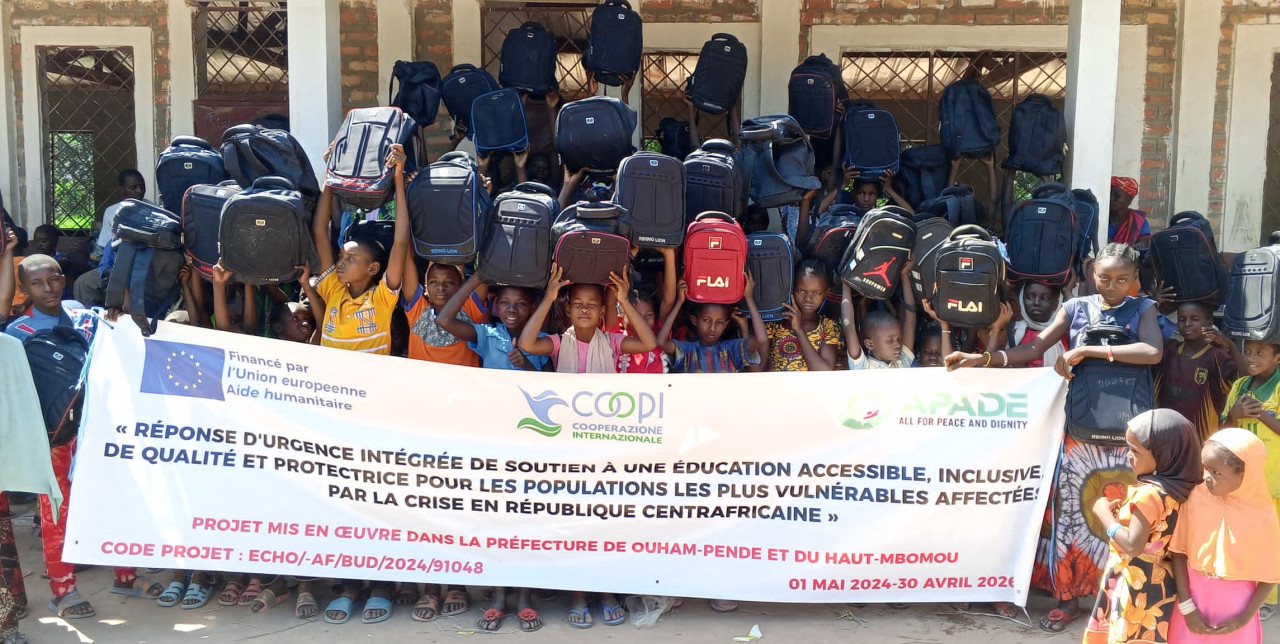17-02-2025 | di COOPI
CAR. Relaunching educational activities in Mboki: a step towards a better future for children
At the beginning of August 2024, COOPI relaunched the ‘Integrated emergency response to support accessible, inclusive, quality and protective education for the most vulnerable populations affected by the crisis in the Central African Republic’ project, thanks to funding from the European Union Commission (ECHO). The aim of the project is to improve access to education for vulnerable children in the Mboki sub-prefecture in the Haut-Mbomou region. In particular, it targets children aged between 6 and 17, displaced young people who are not attending school, those who have dropped out of school or are excluded from the education system, as well as young girls and children living with disabilities.
Between September and December 2024, a number of initiatives were implemented, focusing on 360-degree education.
One of the first actions was the distribution of 547 school kits to pupils at the Mboki experimental school. In addition, eight master teachers working at the school received teaching kits to facilitate learning and indirectly support families.
As one parent explains
I'm a returnee. In August 2023, I fled with my six children after their father was killed during the attacks. Since my return to Mboki in October 2024, I haven't been able to afford to enrol all my children in school, and only three of them have been going, but without much motivation. After the kits were distributed by COOPI, my three children got up early every morning to attend classes. Even my eldest daughter, aged 15, who had stopped studying because of rape and shame, has resumed classes and is preparing to take a competitive examination this year.’
In September 2024, a ten-day training course on explicit teaching brought together master teachers and parents from the schools targeted by the project, including six from the Mboki experimental school. The aim of the training was to provide them with modern teaching tools recognised by the Ministry of Education and to improve the local education system. Two months later, a second capacity-building phase was organised, based on the results of the monitoring and evaluation visits. The pre-tests for the first training course had revealed significant shortcomings, with only 17% of participants scoring above 10. After the second phase, this figure rose to 82%, demonstrating clear progress.
I was expecting to correct mediocre papers, given the initial level of the participants, but I was pleasantly surprised by the progress made. It's very motivating
said the lead facilitator.
Finally, in November 2024, a capacity-building day was organised for members of the Parents' Association at the experimental school. The aim was to remind them of their roles and responsibilities, develop appropriate strategies and prepare the project's exit strategy. The module, developed by the Union Préfectorale des APE, clarified the specific roles of each position within the association.
Through these initiatives, COOPI is actively helping to restore hope and dignity to the vulnerable communities of Mboki. By supporting education and building the capacity of local stakeholders, the project is laying the foundations for a more inclusive and resilient society. The results achieved demonstrate that access to quality education can be a powerful force for social change, even in the most difficult contexts.
COOPI - Cooperazione internazionale has been present in the Central African Republic since 1974, engaging in emergency and development projects mainly in the areas of protection, emergency education and food security. Since July 2021, the ‘Youth, hope for the Central African Republic: Masséka békou ti Bé-Afrika’ project has been supporting youth programmes and their participation in consolidating dialogue and social cohesion.




 Central African Republic
Central African Republic